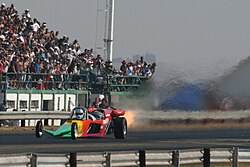



A jet car is a car propelled by a jet engine. A jet dragster is a jet powered car used for drag racing. They are most commonly seen at race shows.




A jet car is a car propelled by a jet engine. A jet dragster is a jet powered car used for drag racing. They are most commonly seen at race shows.
Jet powered cars are commonly used for land speed record attempts, after an FIA rule change that permitted them in 1964. [1]
Some cars such as Green Monster and Vampire raced as dragsters (as well as also achieving or attempting land speed records).
In 2006, while filming an episode for the series Top Gear, presenter and driver Richard Hammond was critically injured in a crash with the jet dragster, Vampire, that he was piloting. [2]
More modern jet dragsters such as Robert Albertson's "Blazing Angel" are capable of reaching over 300 miles per hour (480 km/h) in a quarter of a mile. [3]
Most of these modern cars are powered by the Pratt & Whitney J60 or the General Electric J85 jet engine.[ citation needed ]
{{cite news}}: |author= has generic name (help)